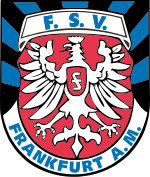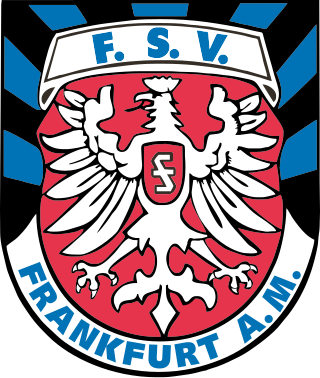FSV Frankfurt
German association football club From Wikipedia, the free encyclopedia
Fußballsportverein Frankfurt 1899 e.V., commonly known as simply FSV Frankfurt and known as simply Frankfurt, is a German association football club based in the Bornheim district of Frankfurt am Main, Hessen and founded in 1899. FSV Frankfurt also fielded a rather successful women's team, which was disbanded in 2006.
 | ||||
| Full name | Fußballsportverein Frankfurt 1899 e.V. | |||
|---|---|---|---|---|
| Nickname(s) | Bornheimer/Die Schwarzen Teufel | |||
| Founded | 20 August 1899 | |||
| Ground | PSD Bank Arena | |||
| Capacity | 12,542 | |||
| Chairman | Patrick Spengler | |||
| Manager | Tim Görner | |||
| League | Regionalliga Südwest | |||
| 2023–24 | Regionalliga Südwest, 9th of 18 | |||
| Website | www | |||
|
| ||||
History
Summarize
Perspective
The club was one of the founding members of the Nordkreis-Liga in 1909, when football started to become more organised in Southern Germany. With the outbreak of the First World War in 1914, this league came to a halt but a championship for the region was still held, which FSV won in 1917.[1]
After the war, the club became part of the Kreisliga Nordmain, which it managed to win in 1922–23, qualifying for the Southern German championship, where it finished last out of five teams.[2]
The pinnacle of the team's achievement was a losing appearance in the 1925 national final, 0–1 to 1. FC Nürnberg, and the capture of a German amateur title in 1972 in a 2–1 victory over TSV Marl-Hüls. The club contested the final of the 1938 Tschammerpokal, predecessor of today's DFB-Pokal, but was beaten 1–3 by Rapid Vienna.
The club played in the Bezirksliga Main, then the Bezirksliga Main-Hessen throughout the 1920s and 1930s. After capturing the championship of the VSFV (Verband Süddeutscher Fussball Vereine or Federation of South German Football Clubs) in 1933, FSV went on to play in the Gauliga Südwest, one of sixteen top-flight divisions formed that same year in the re-organization of German football in the Third Reich. They consistently earned mid-table results there with the club's best finish being second place in 1939. In 1941 the Gauliga Hessen was split into the Gauliga Westmark and the Gauliga Hessen-Nassau with FSV playing in the latter division. The team finished a close second to Kickers Offenbach in 1943 and in 1944 merged briefly with SG Eintracht Frankfurt to play as the wartime side KSG (Kriegspielgemeinschaft) Frankfurt. The following season the Gauliga collapsed with the advance of Allied armies into Germany as World War II drew to a close.

After the war occupying Allied authorities ordered the dissolution of all organizations in Germany, including sports and football clubs. FSV was re-established as SG Bornheim but had taken on their old identity again by late 1945. The team resumed play in the first division Oberliga Süd where they played undistinguished, middling football until relegated at the end of the 1961–62 season. The Bundesliga, Germany's first top-flight professional league, was formed in 1963. FSV joined the Regionalliga Süd and remained a regular tier II side from the early 1960s through to the early 1970s when they slipped to the third tier. The club returned to the second tier in 1975 a year after the formation of the 2. Bundesliga, playing in the 2. Bundesliga Süd. In 1981 the northern and southern divisions of this league were combined and as a perennial lower table side FSV was delivered to the third division Oberliga Hessen (III). The club made a single season cameo appearance in the combined league in 1982–83 before once again falling back.
They played in the Regionalliga Süd (III) in 2007–08 after seven seasons in the Amateur Oberliga Hessen (IV). Winning the championship of the Regionalliga Süd (III), for the 2008–09 season the club was promoted to the 2. Bundesliga, where it played for eight seasons with moderate success before relegation to the 3. Liga at the end of the 2015–16 season.
Reserve team
The club's reserve team, the FSV Frankfurt II, rose for the first time above local Hesse level in 2010 when it won the Hessenliga and was promoted to the Regionalliga Süd. After two seasons, this league was disbanded in 2012 and FSV II became part of the new Regionalliga Südwest. It was relegated to the Hessenliga in 2013 and disbanded the following year after a rule change which meant professional clubs did not have to have a reserve side any more, something that previously had been compulsory.
Frankfurt derby
The 2011–12 season saw FSV Frankfurt play city rivals Eintracht Frankfurt in a league match for the first time in almost 50 years. The last league game between the two had been played on 27 January 1962, then in the Oberliga Süd. For the first of the two matches, FSV's home game on 21 August 2011, the decision was made to move to Eintracht's stadium as FSV's Volksbankstadion only holds less than 11,000 spectators and in excess of 40,000 spectators were expected to attend the game.[3]
Honours
League
|
Cup
|
- ‡ Won by reserve team.
Recent seasons
The recent season-by-season performance of the club:[4][5]
| Season | Division | Tier | Position |
|---|---|---|---|
| 1999–00 | Regionalliga Süd | III | 14th ↓ |
| 2000–01 | Oberliga Hessen | IV | 4th |
| 2001–02 | Oberliga Hessen | 2nd | |
| 2002–03 | Oberliga Hessen | 3rd | |
| 2003–04 | Oberliga Hessen | 6th | |
| 2004–05 | Oberliga Hessen | 2nd | |
| 2005–06 | Oberliga Hessen | 2nd | |
| 2006–07 | Oberliga Hessen | 1st ↑ | |
| 2007–08 | Regionalliga Süd | III | 1st ↑ |
| 2008–09 | 2. Bundesliga | II | 15th |
| 2009–10 | 2. Bundesliga | 15th | |
| 2010–11 | 2. Bundesliga | 13th | |
| 2011–12 | 2. Bundesliga | 13th | |
| 2012–13 | 2. Bundesliga | 4th | |
| 2013–14 | 2. Bundesliga | 13th | |
| 2014–15 | 2. Bundesliga | 13th | |
| 2015–16 | 2. Bundesliga | 17th ↓ | |
| 2016–17 | 3. Liga | III | 20th ↓ |
| 2017–18 | Regionalliga Südwest | IV | 14th |
| 2018–19 | Regionalliga Südwest | 12th | |
| 2019–20 | Regionalliga Südwest | 12th | |
| 2020–21 | Regionalliga Südwest | 6th |
- With the introduction of the Regionalligas in 1994 and the 3. Liga in 2008 as the new third tier, below the 2. Bundesliga, all leagues below dropped one tier.
| ↑ Promoted | ↓ Relegated |
Players
Summarize
Perspective
Current squad
- As of 10 September 2024[6]
Note: Flags indicate national team as defined under FIFA eligibility rules; some limited exceptions apply. Players may hold more than one non-FIFA nationality.
|
|
Former players
Listed are former players with at least one international appearance for their respective national team during their careers
 Richard Herrmann, 1954 FIFA World Cup winner
Richard Herrmann, 1954 FIFA World Cup winner Mathew Leckie, 2014 FIFA World Cup participant
Mathew Leckie, 2014 FIFA World Cup participant
Both players took part while under contract of FSV Frankfurt
 Alexander Opoku
Alexander Opoku Lawrence Aidoo
Lawrence Aidoo Zsolt Kalmár
Zsolt Kalmár Ehsan Hajsafi
Ehsan Hajsafi Amir Shapourzadeh
Amir Shapourzadeh Vincenzo Grifo
Vincenzo Grifo Taiwo Awoniyi
Taiwo Awoniyi Georg Knöpfle, 1928 Summer Olympics participant, Scoring for FSV Frankfurt to be German Champion in the Final 1933, most international appearances under contract of FSV Frankfurt
Georg Knöpfle, 1928 Summer Olympics participant, Scoring for FSV Frankfurt to be German Champion in the Final 1933, most international appearances under contract of FSV Frankfurt Willibald Kreß, 1934 FIFA World Cup participant
Willibald Kreß, 1934 FIFA World Cup participant Albert Eschenlohr
Albert Eschenlohr Hans Schmidt
Hans Schmidt Jens Rasiejewski
Jens Rasiejewski Ronald Borchers
Ronald Borchers Hanno Balitsch
Hanno Balitsch Björn Schlicke
Björn Schlicke Alexander Klitzpera
Alexander Klitzpera Alexander Voigt
Alexander Voigt Adil Chihi
Adil Chihi Aziz Bouhaddouz, 2018 FIFA World Cup participant
Aziz Bouhaddouz, 2018 FIFA World Cup participant Youssef Mokhtari
Youssef Mokhtari Pekka Lagerblom
Pekka Lagerblom Pa Saikou Kujabi
Pa Saikou Kujabi Nikolas Ledgerwood
Nikolas Ledgerwood Jürgen Gjasula
Jürgen Gjasula Artur Maxhuni
Artur Maxhuni Faton Toski
Faton Toski Vlad Munteanu
Vlad Munteanu Bakary Diakité
Bakary Diakité Soumaïla Coulibaly
Soumaïla Coulibaly Momar N'Diaye
Momar N'Diaye Jawhar Mnari
Jawhar Mnari
 Ilian Mitsanski
Ilian Mitsanski Chadli Amri
Chadli Amri Karim Benyamina
Karim Benyamina Babacar Gueye
Babacar Gueye Vyacheslav Hleb
Vyacheslav Hleb Odise Roshi
Odise Roshi Edmond Kapllani
Edmond Kapllani Rasmus Jönsson
Rasmus Jönsson Joan Oumari
Joan Oumari Joni Kauko
Joni Kauko Nikita Rukavytsya, 2010 FIFA World Cup participant
Nikita Rukavytsya, 2010 FIFA World Cup participant Andrew Wooten
Andrew Wooten Zlatko Dedić
Zlatko Dedić Mohamed Amine Aoudia
Mohamed Amine Aoudia Chhunly Pagenburg
Chhunly Pagenburg André Schembri
André Schembri Sofian Chahed
Sofian Chahed Heinrich Schmidtgal
Heinrich Schmidtgal Fanol Përdedaj
Fanol Përdedaj Besar Halimi
Besar Halimi Niki Zimling
Niki Zimling Milad Salem
Milad Salem Maurice Deville
Maurice Deville Alban Sabah
Alban Sabah La'Vere Corbin-Ong
La'Vere Corbin-Ong Moïse Bambara
Moïse Bambara Henrich Benčík
Henrich Benčík Gennadi Bliznyuk
Gennadi Bliznyuk Dennis Cagara
Dennis Cagara Slaheddine Fessi
Slaheddine Fessi Vladimir Firm
Vladimir Firm Daniel Gordon
Daniel Gordon Jacek Grembocki
Jacek Grembocki Chris Henderson
Chris Henderson Mohammadou Idrissou
Mohammadou Idrissou Sead Kapetanović
Sead Kapetanović Miklos Molnar
Miklos Molnar Robert Pache
Robert Pache Kassoum Ouédraogo
Kassoum Ouédraogo Junior Ross
Junior Ross Christoph Westerthaler
Christoph Westerthaler Carl Wijk
Carl Wijk Joe Addo
Joe Addo Jean-Louis Bretteville
Jean-Louis Bretteville William Townley, team manager
William Townley, team manager
Staff
Sports
- Head Coach: Tim Görner
- Assistant Coach: TBA
- Goalkeeping Coach : Christoph Gerigk
- Athletics Coach : Nele Mosqueda
Recent managers
Recent managers of the club:[7]
| Manager | Start | Finish |
|---|---|---|
| Tomas Oral | 1 July 2006 | 4 Oct 2009 |
| Hans-Jürgen Boysen | 7 Oct 2009 | 17 Dec 2011 |
| Benno Möhlmann | 21 Dec 2011 | 18 May 2015 |
| Tomas Oral | 18 May 2015 | 10 April 2016 |
| Falko Götz | 11 April 2016 | June 2016 |
| Roland Vrabec | 16 June 2016 | 6 March 2017 |
| Gino Lettieri | 7 March 2017 | 18 May 2017 |
| Alexander Conrad | 1 July 2017 | 13 April 2019 |
| Thomas Brendel | 14 April 2019 | 30 June 2021 |
| Angelo Barletta | 1 July 2021 | 26 September 2021 |
| Thomas Brendel | 27 September 2021 |
Women's department
The women's team won three championships and five cups, even completing a double in 1995, but was retired after the 2005–06 season due to financial weakness.[8] In its time FSV had many German top football players, including national record scorer Birgit Prinz, who left in 1998 for local rival 1. FFC Frankfurt.
Honours
- German Championship: 1986, 1995, 1998
- DFB-Pokal winner: 1985, 1990, 1992, 1995, 1996
Notable past players
The following players who have played for Frankfurt have been capped for Germany at least 50 times:[9]
Other sports departments
As a sports club FSV has had at various times departments for athletics, boxing, darts, handball, ice hockey, and tennis.[10]
References
External links
Wikiwand - on
Seamless Wikipedia browsing. On steroids.
